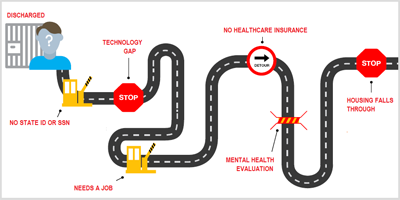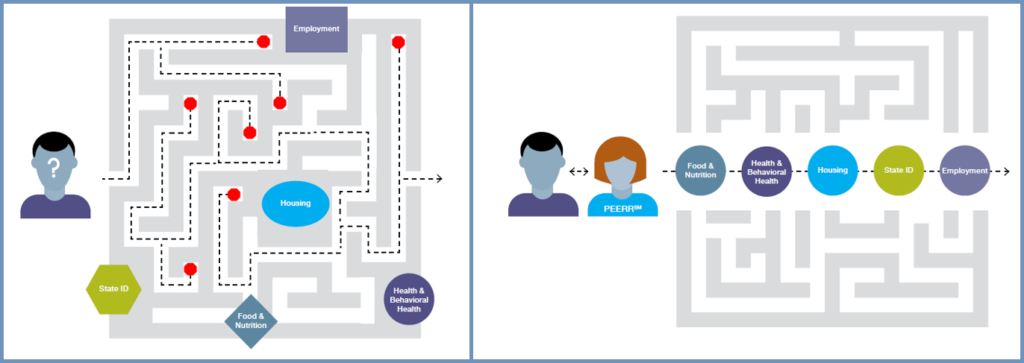Reentry Services

Growing out of efforts around the early release of prisoners in Illinois during the COVID pandemic, the Supportive Reentry Network Healthcare Transformation Collaborative (formerly known as PEERR), an emergency effort spearheaded by the Safer Foundation, set up connections to services needed to stabilize returnees in the community. Findings coming from that experience informed a longer-term project providing coordinated reentry services for returning citizens in Chicago and Cook County. Individuals released from jail or prison are matched with a navigator who helps them make their journey through the many barriers to reentry. We are working to prove out this approach in a demonstration of the benefits to both returning citizens and the community, with the aim of making wraparound services an evidence-based element of public policy.
IN A NUTSHELL
The Supportive Reentry Network Collaborative is a group of health and social services providers who help people returning home to Chicago or Cook County after detention. It is essentially like a health plan with social benefits for this targeted special needs population.
Now working with a state grant for a three-year Healthcare Transformation project, the network will apply a whole-health approach to serving returning residents, facilitating access across a range of public benefits assistance, medical and behavior health, and connections to housing, food and nutrition, transportation, and employment. Key to this program is the role of navigators, who assist returnees in stabilizing in the community..

BACKGROUND
In early 2020, as jails and prisons were becoming covid-19 “hotspots,” Governor Pritzker’s executive order allowed early release of individuals nearing the end of their sentences and medical furloughs for those with vulnerable health. This resulted in the release of 1,680 people between March 24 and August 24.
Coordinating reentry services in Chicago and Cook County, Safer Foundation created the PEERR Network, launched a hotline, and deployed a team of reentry navigators to help returning citizens overcome barriers to reentry. Working with the Safer, we conducted journey mapping with participants, using storytelling and visualization to shed light on the challenges faced by those returning from incarceration. Together, we crafted recommendations for services to facilitate reentry – which is challenging enough in “normal” times – and thus to provide a way to make restorative justice the new status quo.

THE BARRIERS
Besides the stigma already faced for their conviction records, returning citizens have to contend with lack of state ID, lack of digital literacy, limited financial resources, and unstable housing. Many have restrictions as part of parole requirements and electronic monitoring. During the pandemic, many had been on lockdown due to the quarantine and civil unrest, which impaired their access to care packages, food, clothing, employment, and healthcare services. Once out, they were confronted with a challenging maze of roadblocks and hurdles standing between themselves and the life in the community that is now supposed to be open to them.
DEDICATED REENTRY NAVIGATORS
Reentry navigators help returning citizens make their way through the thicket of roadblocks and hurdles that confront them upon release. They assist them in applying for or accessing:
- Parole requirements
- Securing a state ID
- Healthcare coverage and prescriptions
- Getting a job
- Managing family expectations
THE SUPPORTIVE REENTRY NETWORK
The Supportive Reentry Network consists of providers specializing in social services that address social determinants of recidivism, such as healthcare, behavioral health, housing, food and nutrition, and employment. Providers offered crisis intervention throughout the homelessness and mental health process. Many of them continue as partners in the Healthcare Transformation Collaborative. (More information about Illinois Healthcare Transformation Collaboratives.)

FINDINGS FROM ORIGINAL PRISON EMERGENCY EARLY RELEASE RESPONSE (PEERR) in 2020
The large-scale early release created an opportunity to study and better understand the experience of returning citizens. Surveys of 323 of the 660 individuals referred to PEERR, combined with journey mapping, produced a number of insights concerning people incarcerated in Illinois and their needs:
- 80% are minorities, primarily African American
- 70% meet diagnostic criteria for drug and/or alcohol use disorders
- 15% of men and 30% of women have a serious mental illness
- Individuals transitioning from jail are 8 times more likely to die from overdose than the general population
- The absence of connections to services for those returning was a key finding
MILESTONES
2022 – The collaborative’s three-year demonstration launches with a new name, the Supportive Reentry Network Collaborative, offering a benefits package to returning residents leaving IDOC and Cook County jail after March of 2020 The SRNC is launching a new component with Cook County Health that reconnects participants who end up in the CCH emergency department with their Reentry Navigator.
2021 – The original PEERR Network partners apply for a Healthcare Transformation Collaborative with Safer Foundation as the lead partner. The Collaborative is awarded a three-year Healthcare Transformation grant. Cook County Health joins the collaborative.
2020 – Governor Pritzker’s executive order leads to early release of 1,680 people from incarceration. Safer Foundation creates the PEERR Network of service providers, launches a hotline, and deploys reentry navigators to assist returning citizens. Together, we survey and interview the participants to identify the challenges faced by returning citizens.
PEERR: Responding to Early Release – SRNC: Healthcare Transformation Collaborative
WHAT’S NEXT?
The Supportive Reentry Network Healthcare Transformation Collaborative launched in 2022; participants will be referred by the Department of Corrections and the Cook County Sheriff’s office. The Lived Experience Advisory council will provide input into needs and service delivery. Smart Policy Works will facilitate cross-agency coordination for meeting the transformation grant objectives and perform services-delivery troubleshooting. The goal is to generate results and outcome measures that support development of a permanent reentry supports for returning residents, improving quality of life and decreasing recidivism.
LEADERSHIP
- Smart Policy Works LLC
- Heartland Alliance Health
- Healthcare Alternative Systems, Inc..
- KAM Alliance, Inc.
- Cook County Health
- Safer Foundation
- Transforming Reentry Services/MWIP
- Get to Work
- Legal Council for Health Justice
CONTACT
For more information contact Barbara Otto, barbara@smartpolicyworks.com, or Sodiqa Williams, Sr. Vice President, Supportive Reentry Division, Safer Foundation, sodiqa.williams@saferfoundation.org.
CONTRIBUTIONS
The work of the PEERR Network was made possible by generous support and contributions including funding, cell phones, care packages, gift cards, and more.
- AT&T
- Chicago Community Trust
- Illinois Criminal Justice Information Authority
- Meridian Health
- The Robert R. McCormick Foundation
- United Way
Let’s achieve change together